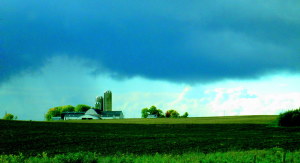 November 19
November 19
________________________________________
DAVID LEFT VENGEANCE TO GOD
May his days be few; May another take his office.
9 May his children be fatherless, And his wife a widow.
10 May his children wander about and beg;
And may they seek sustenance far from their ruined homes.
11 May the creditor seize everything that he has,
And may strangers plunder the product of his labor.
12 May there be none to extend kindness to him,
Nor any to be gracious to his fatherless children.
13 May his descendants be eliminated;
May their name be wiped out in a following generation. -Psalm 109:8-13
________________________________________
Enduringword.com comments that this is a psalm of David, and is thought to be the strongest of what are known as the imprecatory psalms, David’s songs that call down curses upon his enemies. It is important to remember that these are prayers, committing vengeance unto God. With the greater revelation of grace and truth that came by Jesus Christ, we understand that we are to pray for the good of our enemies, and not for their ruin. Yet, we remind ourselves that David refused to act upon these curses; he left vengeance up to God. This is especially relevant regarding David, who knew what it was to take life with the sword. When David withheld vengeance, it was because he chose to, not because he lacked the opportunity, skill, or courage. This begins a long and intense set of curses that David pronounced against his enemy. There are some who think that verses 6 onwards describe the lying words that David’s enemies spoke against him, and that the use of the singular in that section proves it – as well as later in verse.
Morgan had this opinion: “I entirely agree with those expositors who treat this passage as the singer’s quotation of the language of his enemies against him.” It is fair to note that the tone of these curses is generally in the form of prophecies rather than immediate curses. David predicted the righteous judgment to come rather than pronouncing it – though, he certainly wished for this judgment.
What is amazing with David is that even his vengeance, he lifts it up to God so that he won’t do the wrong thing. He leaves everything in God’s hand. He never operates on his own strength or understanding, something that is a novelty in our world today.
________________________________________
REFLECTION
• How can we develop the habit of dependence on God on everything?
Monthly Archives: November 2020
LORD, DO NOT BE SILENT, DEAL WITH MY ENEMIES ILMA’S VLOG

November 18
________________________________________
LORD, DO NOT BE SILENT, DEAL WITH MY ENEMIES
God of my praise, do not be silent!
2 For they have opened a wicked and deceitful mouth against me;
They have spoken against me with a lying tongue.
3 They have also surrounded me with words of hatred,
And have fought against me without cause.
4 In return for my love they act as my accusers;
But I am in prayer.5 So they have repaid me evil for good,
And hatred for my love.6 Appoint a wicked person over him,
And may an ]accuser stand at his right hand.
7 When he is judged, may he come out guilty,
And may his prayer become sin. -Psalm 109:1-7
________________________________________
Matthew Henry says: “Whether David penned this psalm when he was persecuted by Saul, or when his son Absalom rebelled against him, or upon occasion of some other trouble that was given him, is uncertain; and whether the particular enemy he prays against was Saul, or Doeg, or Ahithophel or some other not mentioned in the story, we cannot determine; but it is certain that in penning it, he had an eye to Christ, his sufferings and his persecutors, for that imprecation (v8) is applied to Judas (Acts 1:20). The rest of the prayers here against his enemies were the expression, not of passion, but of the Spirit of prophecy. He lodges a complaint in the court of heaven of the malice and base ingratitude of his enemies and with it, an appeal to the righteous God. He prays against his enemies and devotes them to destruction.
People may be wondering how David could pray this way to God, almost like giving God a command in verse 1 not to let these evil people continue their ways without being rebuked or corrected and punished. In verse 2, he files a complaint to God for their lies and wickedness. It only exhibits David’s dependence on a God he really knew very well. He knows that he belongs to Him and that the Lord hates evil. He is looking forward to be vindicated by God as he opens up his heart to God for all the evil done to him by his enemies. Like a little child, in verses 3-4, he tells the Lord what they have done to him and yet he repaid them good for the evil they did. In verse 6, he pleads God to bring justice to the evil they have done to him.
________________________________________
REFLECTION
• How often do we come to God for deliverance like David does?
THOSE WHO SEEK THE LORD PRAISE HIM ILMA’S VLOG

November 17
________________________________________
From You comes my praise in the great assembly;
I shall pay my vows before those who fear Him.
26 The afflicted will eat and be satisfied;
Those who seek Him will praise the LORD. May your heart live forever!
27 All the ends of the earth will remember and turn to the LORD,
And all the families of the nations will worship before You.
28 For the kingdom is the LORD’S and He rules over the nations.
29 All the prosperous of the earth will eat and worship,
All those who go down to the dust will kneel before Him,
Even he who cannot keep his soul alive.30 A posterity will serve Him;
It will be told of the Lord to the coming generation.
31 They will come and will declare His righteousness
To a people who will be born, that He has performed it.- Psalm 22:25-31
________________________________________
King David certainly knows how his God provides. In verse 25, he appreciates those who fear the Lord and acknowledges and respects them. In verse 26, he consoles those who are afflicted just as Jesus in Matthew 5 comforts those who are afflicted or poor in spirit as well as those persecuted for His sake. David encourages them to look up to God’s promise that He will provide for them and alleviate them of their pain and suffering. He says a blessing to those who are faithful to the Lord and pray that their hearts continue to submit and offer their hearts to the Lord.
In verse 27, he gives a hopeful perspective to all those who worships the Lord and passes on to their families such praise. In verse 28, he reminds us all that everything belongs to God and he is in control and rules all things. Verse 29 recounts the equality that God gives his creation. God treats everyone justly and that whatever we sow, we will reap. In verse 30, King David reminds us of the promise that God’s people made to God, that the next generation will know all the good deeds that the Lord has made. In verse 31, David says a prophetic prayer: that all those who live for God’s righteousness, many generations will rise from them and that they will all witness to the magnificence of God’s creation and His plan for mankind. David clearly tells us that those who constantly seek the Lord will never stop declaring their awe of God’s mighty deeds and goodness.
________________________________________
REFLECTION
• How is praising the Lord a result of seeking Him?
SAVE MY SOUL FROM THE SWORD ILMA

November 16
________________________________________
SAVE MY SOUL FROM THE SWORD
But You, LORD, do not be far away;
You who are my help, hurry to my assistance.
20 Save my soul from the sword,
My only life from the power of the dog.
21 Save me from the lion’s mouth;
From the horns of the wild oxen You answer me.
22 I will proclaim Your name to my brothers;
In the midst of the assembly I will praise You.
23 You who fear the LORD, praise Him;
All you descendants of Jacob, glorify Him,
And stand in awe of Him, all you descendants of Israel.
24 For He has not despised nor scorned the suffering of the afflicted;
Nor has He hidden His face from him;
But when he cried to Him for help, He heard. – Psalm 22:19-24
________________________________________
According to a commentary, verse 19 is the request of Psalm 22:11 is repeated her. David seemed to believe that he could endure anything if he enjoyed the conscious presence of God. His plea is not focused on the change of his situation, but on the presence of God in the crisis. How many of us focus on God’s presence when we are in trouble and trials? We automatically want to change or solve the problem, don’t we?
In verse 22, David declares how he will praise the Lord in the whole assembly and his trust and his knowledge of God’s character is reflected in the following verse 23. He admonishes all of God’s people to continue to give the Lord all the praise and give Him all the respect and adulation that only Him alone is worthy of.
In verse 20, he asks deliverance from the sword. According to Horne’s commentary, “The wrath of God was the ‘sword,’ which took vengeance on all men…it was the ‘flaming sword,’ which kept men out of paradise.”
In verse 24, David repeats his trust in the Lord and how much he knows His faithful God. He looks forward for deliverance because He knows that God will never turn His back on His own people. How many believers focus on the promises of God and His faithful character which leads us to a hopeful perspective in life? Why is it so easy for humans to dwell on the negative instead of the promises of God?
________________________________________
REFLECTION
• Why must we remember fear the Lord always?
DO NOT BE FAR FROM ME O LORD ILMA’S VLOG
 November 15
November 15
________________________________________
DO NOT BE FAR FROM ME O LORD
Yet You are He who brought me forth from the womb;
You made me trust when upon my mother’s breasts.
10 I was cast upon You from birth;
You have been my God from my mother’s womb.
11 Do not be far from me, for trouble is near;
For there is no one to help. 12 Many bulls have surrounded me;
Strong bulls of Bashan have encircled me.
13 They open their mouths wide at me, as a ravening and roaring lion.
14 I am poured out like water, and all my bones are out of joint;
My heart is like wax; it is melted within me.
15 My strength is dried up like a piece of pottery,
And my tongue clings to my jaws; and You lay me in the dust of death.
16 For dogs have surrounded me; a band of evildoers has encompassed me;
They pierced my hands and my feet. 17 I can count all my bones.
They look, they stare at me; 18 They divide my garments among them,
And they cast lots for my clothing. – Psalm 22:9-18
________________________________________
According to a commentary, David seemed to believe that he could endure anything if he enjoyed the conscious presence of God. His plea is not focused on the change of his situation, but on the presence of God in the crisis. Hasten to help Me…. Deliver Me…. Save Me: Picturing his adversaries as vicious animals (the dog…the lion’s mouth…the horns of the wild oxen), David pleaded for the help and deliverance from all these trials.
These lines reflect not only the great danger and misery of both David and his Only Begotten Son, but especially their trust in the LORD God as their deliverer. He and He alone is their hope.
What do we usually do when we are beset by troubles and conflicts? Don’t we become discouraged and hopeless? That is our human nature. In this psalm, we witness again how David, just like Jesus automatically run to God for defense. They do not defend themselves automatically. Instead, like little children, they go to God and rely on Him to get protection. We, humans, rely so much on our own strength especially in times of trouble and danger because we have been so corrupted by the world’s system.
________________________________________
REFLECTION
• How can we learn to depend more on God for deliverance and protection?
MY GOD, MY GOD, WHY HAVE YOU FORSAKEN ME ILMA’S VLOG

November 14
________________________________________
MY GOD, MY GOD, WHY HAVE YOU FORSAKEN ME?
My God, my God, why have You forsaken me?
Far from my help are the words of my groaning.
2 My God, I cry out by day, but You do not answer;
And by night, but I have no rest.3 Yet You are holy,
You who are enthroned upon the praises of Israel.
4 In You our fathers trusted; they trusted and You rescued them.
5 To You they cried out and they fled to safety;
In You they trusted and were not disappointed.
6 But I am a worm and not a person,
A disgrace of mankind and despised by the people.
7 All who see me deride me; they sneer, they shake their heads, saying,
8 “ Turn him over to the LORD; let Him save him;
Let Him rescue him, because He delights in him. – Psalm 22:1-8
________________________________________
This psalm of David is directly spoken by Jesus according to Matthew 27:46, on the cross at about three o’clock. How can David have known that he spoke exactly what Jesus was going to experience over a thousand years later? This was a prophetic word that David which clearly was revealed to him by God’s Spirit. In the life of David, we witness many instances where he could have written such agonizing cry to his Lord. After all, he went through a lot of suffering, trials and attacks from his many enemies. While this psalm was certainly David’s agony in his life experience, it is even truer of Jesus the Messiah than of David. Jesus deliberately chose these words to describe His agony on the cross in Matthew 27:46. Boice comments that “We can be fairly certain that Jesus was meditating on the Old Testament during the hours of his suffering and that he saw his crucifixion as a fulfillment of Psalm 22 particularly.”
The repetition of My God twice must have expressed the deep pain and agony Jesus must have felt on the cross, something that King David must have felt as he wrote this psalm. It is amazing how God has known that all these same lines will be spoken by His one and only Son, whom He allowed to go through the ache and anguish to save mankind. Perhaps we are going through the same pain in our lives right now because of an illness or a death in our family. Could you imagine how much more painful it was for Jesus to carry all our sins?
________________________________________
REFLECTION
• Why do you think Jesus uttered these same lines at the time of His death?
THIS IS THE DAY TO REJOICE AND BE GLAD ILMA’S VLOG
 November 13
November 13
________________________________________
THIS IS THE DAY TO REJOICE AND BE GLAD
This is the day which the LORD has made;
Let’s rejoice and be glad in it.
25 Please, O LORD, do save us;
Please, O LORD, do send prosperity!
26 Blessed is the one who comes in the name of the LORD;
We have blessed you from the house of the LORD.
27 The LORD is God, and He has given us light;
Bind the festival sacrifice to the horns of the altar with cords.
28 You are my God, and I give thanks to You;
You are my God, I exalt You.
29 Give thanks to the LORD, for He is good;
For His mercy is everlasting. -Psalm 118:24-29
________________________________________
Enduringword.com comments on verse 24 as the verse when Jesus quoted verse 22 (at Matthew 21:42, Mark 12:10-11, and Luke 20:17), He did so in response to the praise and hosannas given to Him at what is commonly called the triumphal entry. Since this psalm is prophetically connected with that event, the day mentioned here can be prophetically understood as the day Jesus formally entered Jerusalem as Messiah and King. It is true in a general sense that the LORD makes every day, and there is reason to rejoice and be glad in every day. Yet specifically, the day the LORD made to rejoice and be glad in was the day Jesus entered Jerusalem with hosannas welcoming Him as Israel’s Savior. If on that day human voices failed to rejoice and be glad, Jesus said that the very stones would cry out their praises and hosannas (Luke 19:40).
It is a sad to watch many of us take for granted each and every day the Lord has made. We become so complacent and ungrateful. We fail to rejoice and be glad that we have another day to serve the Master of all masters and King of all kings. We are consumed living for ourselves that we have forgotten the faithful God who loves us so much that He gave his only Son, so we could be reconciled to Him. We have failed to walk in His light and constantly praise Him. As the psalmist reminds us in verse 29 to be grateful for God because He is good and His mercy lasts forever. Let us never fail to acknowledge and worship a faithful and loving Father who gives us all the time to come close to Him.
________________________________________
REFLECTION
• How can we manifest gratitude to God and be glad for the days we are given?
REJECTED STONE BECOMES CHIEF CORNERSTONE ILMA’S VLOG

November 12
________________________________________
REJECTED STONE BECOMES CHIEF CORNERSTONE
Open the gates of righteousness to me;
I will enter through them, I will give thanks to the LORD.
20 This is the gate of the LORD;
The righteous will enter through it.
21 I will give thanks to You, for You have answered me,
And You have become my salvation.
22 A stone which the builders rejected
Has become the chief cornerstone.
23 This came about from the LORD;
It is marvelous in our eyes. – Psalm 118:19-23
________________________________________
I quote enduringword.com commentary on these verses in Psalm 118. In psalm 19, The psalmist probably had in mind a triumphal entry into the holy city. With those gates open, he would go through them, full of praise to the LORD.” Spurgeon states “Alas, there are multitudes who do not care whether the gates of God’s house are opened or not; and although they know that they are opened wide they never care to enter, neither does the thought of praising God so much as cross their minds. The time will come for them when they shall find the gates of heaven shut against them, for those gates are peculiarly the gates of righteousness through which there shall by no means enter anything that defileth.” In verse 20, we picture the singer actually passing through the open gate, In verse 22 regarding the stone that the builders rejected, we don’t know what personal experience the psalmist might have had that led to these words. Perhaps it was purely a prophetic statement, because it certainly was fulfilled in the work of Jesus.They didn’t approve of His origin (John 7:52).They didn’t approve of His lack of formal education (John 7:15). They didn’t approve of His disregard for religious traditions (Luke 6:2). They didn’t approve of His choice of friends (Matthew 9:11). Spurgeon says “Still do the builders refuse him: even to this day the professional teachers of the gospel are far too apt to fly to any and every new philosophy sooner than maintain the simple gospel, which is the essence of Christ: nevertheless, he holds his true position amongst his people, and the foolish builders shall see to their utter confusion that his truth shall be exalted over all.”
We need to follow how Jesus set himself apart from the world so we can follow his lead. ________________________________________
REFLECTION
• Why should we not be bothered when we are rejected by others?
THE LORD IS MY STRENGTH AND SONG ILMA’S VLOG
 November 11
November 11
________________________________________
THE LORD IS MY STRENGTH AND SONG
All nations surrounded me;
In the name of the LORD I will certainly fend them off.
11 They surrounded me, yes, they surrounded me;
In the name of the LORD I will certainly fend them off.
12 They surrounded me like bees;
They were extinguished like a fire of thorn bushes;
In the name of the LORD I will certainly fend them off.
13 You pushed me violently so that I [was falling,
But the LORD helped me. 14 The LORD is my strength and song,
And He has become my salvation.
15 The sound of joyful shouting and salvation is in the tents of the righteous;
The right hand of the LORD performs valiantly.
16 The right hand of the LORD is exalted;
The right hand of the LORD performs valiantly.
17 I will not die, but live, and tell of the works of the LORD.
18 The LORD has disciplined me severely,
But He has not turned me over to death. -Psalm 118:10-18
________________________________________
Enduringword.com comments on this psalm as: “Quoting Miriam’s song (Exodus 15:2), the singer knew not only that God could bring strength and a song, but that Yahweh Himself became their strength and the song of those who put their trust in Him. Going even further, the psalmist understood that Yahweh had become his salvation. Yahweh is these things for His people. When the LORD is our strength, it means that He is our resource and our refuge. We look to Him for our needs, and we are never unsatisfied. When the LORD is our song, it means that He is our joy and our happiness. We find our purpose and life in Him, and He never disappoints. When the LORD is our salvation, it means we put our trust for help and deliverance in none other. He is our rest and rescue. With all this true, it emphasizes the importance of seeking God Himself when we need strength, a song, or salvation. Often, we seek the things themselves, sometimes as even detached from God Himself. To seek God and to receive Him is to receive all these profound gifts.” We all need to learn to strengthen our dependence on God alone. Even though we live in this world, we need to live for eternity.
________________________________________
REFLECTION
• When was the last time you made the Lord your strength and song?
BETTER TO TAKE REFUGE IN GOD THAN TO TRUST PEOPLE ILMA’S VLOG
 November 10
November 10
________________________________________
BETTER TO TAKE REFUGE IN GOD THAN TO TRUST PEOPLE
Give thanks to the LORD, for He is good;
For His mercy is everlasting.
2 Let Israel say, “His mercy is everlasting.”
3 Oh let the house of Aaron say, “His mercy is everlasting.”
4 Let those who fear the LORD say,
“His mercy is everlasting.”
5 From my distress I called upon the LORD;
The LORD answered me and put me in an open space.
6 The LORD is for me; I will not fear; What can man do to me?
7 The LORD is for me among those who help me;
Therefore I will look with satisfaction on those who hate me.
8 It is better to take refuge in the LORD than to trust in people.
9 It is better to take refuge in the LORD than to trust in noblemen.
– Psalm 118:1-9
________________________________________
Psalm 118 does not name an author in its title, but there is reason to believe it was King David. Ezra 3:10-11 suggests that Psalm 118 was sung at the founding of the second temple, and when they sang it, they attributed it to David. According to Campbell Morgan, though this was likely David’s psalm, it was also Jesus’ psalm. “This is pre-eminently the triumph song of the Christ, He the ideal Servant, He the perfect Priest, He the Leader of the people. How much all these words meant to Him as He sang them on that night in the upper room.” Spurgeon comments on the first verse “for He is good” as “This is reason enough for giving him thanks; goodness is his essence and nature, and therefore he is always to be praised whether we are receiving anything from him or not. Those who only praise God because he does them good should rise to a higher note and give thanks to him because he is good.”
In verse 4, the psalmist emphasizes the importance of fearing the Lord: God’s mercy is upon them. In verse 6, it reminds us not to fear man because God will be our vindicator and protector, and in verse 8, we are warned not to seek refuge to man but to God only.
________________________________________
REFLECTION
• Why is it better to run to God when we are in trouble than to rely on others and ourselves?
• Why should we always give thanks to the Lord on a regular basis?
